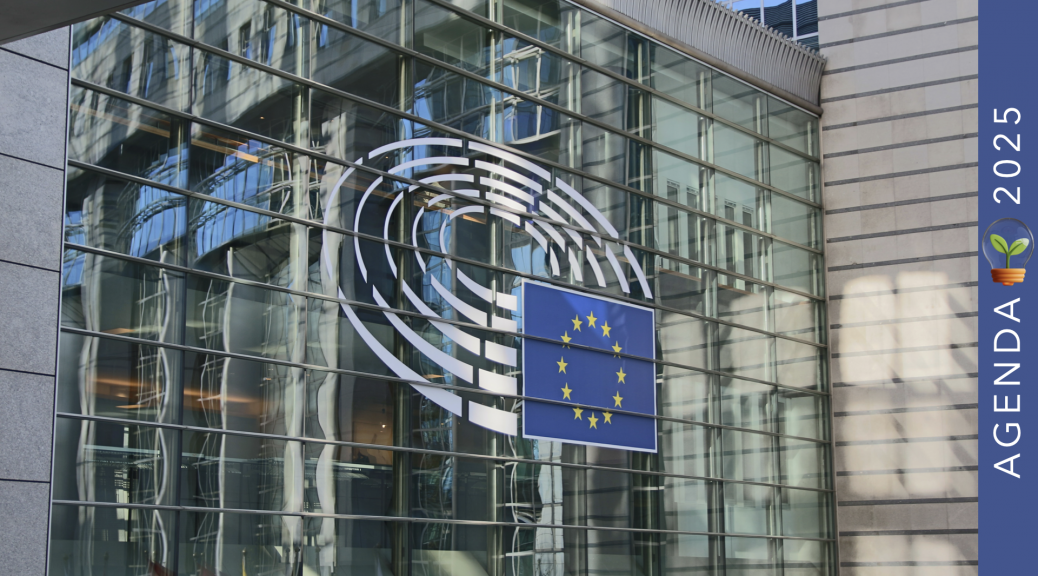
AGENDA 2025: The Digital Markets Act and Section 19a GWB
This article is part of the D’Kart Spotlights: AGENDA 2025, in which experts from academia and practice comment on aspects of the Competition Policy Agenda presented by the Federal Ministry of Economic Affairs and Climate Action (BMWK). The contributions already published can be found here.
Section 19a is undoubtedly the most important piece of the 10th amendment to the Act against Restraints of Competition (GWB). Gunnar Wolf and Niklas Brüggemann present their view on the relationship of this law to the new DMA.
The Digital Markets Act (DMA) and Section 19a of the Act against Restraints of Competition (GWB) are undoubtedly children of their time. When the changing landscape of competition in dynamic technology markets first dominated the discourse on competition policy more than twenty years ago, the view prevailed that the existing set of instruments was up to the challenge. In the US and Europe, competition authorities ran successful cases against the world’s most powerful software company. In the aftermath, other companies then took the lead during the technological paradigm shifts first from PC to internet and then subsequently from internet to mobile internet. However, doubts about the dogma that existing monopoly positions are simply swept away by innovative newcomers in the gale of creative destruction became more vocal again after the winners on the internet not only transferred their market power to the mobile internet, but even managed to strengthen it. The effects of this increasing market power were subsequently amplified by the ongoing digitisation of more and more sectors of the economy. As a result, the discourse on competition policy in technology markets picked up speed again almost everywhere in the world, and after an impressive number of articles, reports and symposia, the overwhelming opinion today seems to be that competition in these markets is indeed fundamentally different and cannot be sustained without state intervention.
In contrast to twenty years ago, the societal consensus on the economic order as a whole also seems to be changing in this context. With Rupprecht Podszun, one can interpret this as a renaissance of the well-known and proven ordoliberalism – be that as it may, there are signs of a “Zeitenwende” also in antitrust law.
European and German legislators have responded to this zeitgeist in different ways. At European level, the DMA went through the legislative process very quickly and will soon enter into force. In Germany, the legislator introduced the new Section 19a GWB with the 10th amendment to the GWB, which has already led to the first proceedings and decisions by the Bundeskartellamt[Federal Cartel Office]. Against this background, the Competition Policy Agenda 2025 of the Federal Ministry for Economic Affairs and Climate Action places a strong focus on safeguarding competition in digital markets (esp. through Section 19a and the DMA) as well as on other relevant areas such as globalisation and sustainability.
This the background for the following reflections on the relationship between the DMA and Section 19a GWB. This relationship will be analysed along three dimensions: legal nature, complementarity and coordination. For a comprehensive description of the DMA and Section 19a GWB, we refer to the close and excellent coverage by this blog.

Legal nature: regulatory law vs. competition law
As already indicated, the DMA and Section 19a GWB are both based on the same problem analysis. Both laws have also influenced each other during the legislative process, even if the draft Section 19a GWB preceded the DMA and was enacted earlier. However, they significantly differ in terms of legal nature and technical conception. Even if the diagnosis is similar, the administered cure is not.
With the DMA, the European legislator has deliberately opted for competition-related regulatory law but precisely not for competition law stricto sensu. According to recital 10 of the DMA, the latter is merely “complemented” and remains applicable in parallel. The DMA differs from the enforcement of competition law in that the latter is based on “an individualised assessment of market positions and behaviour, including its actual or potential effects and the precise scope of the prohibited behaviour, and which provide for the possibility of undertakings to make efficiency and objective justification arguments for the behaviour in question”. Recital 11 further underlines in this context that the DMA pursues legal interests that are different from competition law, namely “to ensure that markets where gatekeepers are present are and remain contestable and fair, independently from the actual, potential or presumed effects of the conduct of a given gatekeeper […] on competition on a given market.” Consequently, the DMA is based on the internal market clause of Article 114 TFEU and not on Article 103 TFEU. The DMA thus deliberately sets a regulatory framework for competition in digital markets, based on the fundamental principles of fairness and contestability. The latter are outlined in more detail in Article 12 and recitals 31-34.
This choice in favour of a regulatory instrument has two significant consequences. First, the DMA is a priori limited in scope. It applies in subjective terms only to a small number of gatekeepers. These must operate at least one of ten specific core platform services that are particularly important from a competition perspective (Article 2(2) DMA) and must also be designated by the Commission in a formal decision (Article 3 DMA). Such a designation only takes place insofar as the respective undertakings have reached a certain size, the central platform services concerned represent an “important gateway for business users to reach end users” and overall an “entrenched and durable position” has been reached or is foreseeable (Article 3(1) DMA). Corresponding presumptions in Article 3(2) DMA simplify the determination of the subjective scope of application.
Secondly, in objective terms, the DMA only imposes certain specific behavioural obligations for conduct by designated gatekeepers that have proven to be particularly harmful, as laid down mainly in Articles 5 and 6, but also in Articles 7, 11, 14 and 15. This specific catalogue of obligations is in principle directly applicable with regard to the designated core platform services and allows – accepting the usual grey areas at the margins – a high degree of predictability and legal certainty. The DMA thus does not adopt the typical regulatory technique in competition law of a general clause – if necessary further specified by a number of examples –, which then requires an ex post specification by the competition authority on the basis of the underlying conduct and its effects on the affected markets in the concrete individual case at hand. Rather, the DMA changes the perspective: it prohibits certain conduct per se and thus ex ante, in principle without regard to the concrete effects in casu.
Section 19a GWB, on the other hand, is essentially an instrument of competition law. It allows the Bundeskartellamt to intervene in certain constellations to protect competition, which may also fall under Article 102 TFEU but do not necessarily have to do so. The application of Section 19a GWB requires a paramount significance for competition across markets, for the determination of which a dominant position is a possible but not a mandatory criterion. Section 19a GWB is based on several abstract grounds for prohibition in paragraph 2, which are then further specified by a number of examples. Section 19a GWB is obviously closely linked with Section 19 GWB, without, however, completely overlapping with it. In consistence with this conceptual approach, the draft bill for the 10th GWB amendment refers to Section 19a GWB as a form of “special abuse control” (p. 75).
By consequence, Section 19a(2) sentence 2 GWB also allows, in the tried and tested manner of antitrust law, for a justification defence , which is subject to reversal of the burden of proof . Section 19a GWB thus navigates in the familiar waters of the second chapter of the GWB. In any event, it can be summarised that Section 19a GWB, unlike the DMA, does not constitute regulatory law but competition law.

Complementarity: primacy of application of the DMA
The main concern of the DMA is to ensure the contestability and fairness of digital markets in the European Single Market. To this end, Article 1(6) and (7) provide for specific conflict-of-law rules that serve to provide for an abstract delimitation of the DMA and competition law.
The starting point is the core conflict of law rule in Article 1(6), the first sentence of which states that the DMA does not affect the application of Articles 101 and 102 TFEU. According to sentence 2 lit. a, the same applies to their national equivalents. Hence, the result is parallel applicability. For Articles 101 and 102 TFEU, which constitute European primary law, this already follows from the general hierarchy of norms and the different objectives of competition law and regulatory law (see above). Against the background of the convergence rule in Article 3 (1) of Regulation 1/2003, it was only logical to extend this parallel applicability to national competition law as well, insofar as it converges with Articles 101 and 102 TFEU.
A more differentiated rule can be found in Article 1 (6) sentence 2 lit. b which encompasses inter alia also Section 19a GWB. According to this provision, national competition laws that prohibit other unilateral conduct – i.e. conduct beyond the abuse of a dominant position within the meaning of Article 102 TFEU – can in principle also be applied in parallel to the DMA. However, this parallel application is subject to two important alternative conditions. Such stricter national competition law can only apply to the extent that (1) it is applied to undertakings other than designated gatekeepers or (2) it imposes further obligations on designated gatekeepers that go beyond the DMA.
Both conditions are based on a deliberate choice of the legislator, according to which the DMA opens up a limited scope for national competition rules that go beyond Article 102 TFEU. To the extent that such national competition rules remain within this scope, there is no conflict with the DMA. The harmonisation of the digital single market pursued by the DMA, based on Article 114 TFEU, requires that outside this scope there are no overlapping national rules within the scope of the DMA.
Section 19a GWB thus applies insofar as it is not used against gatekeepers or against gatekeepers to impose further obligations that go beyond the catalogue of obligations of the DMA. In this context, it should be noted that the designation of a gatekeeper under Article 3 DMA is always made in relation to one or more specific central platform services (see also recital 15). Therefore, as long as central platform services within the meaning of Article 2(2) DMA are not (yet) the subject of a designation decision, the gatekeeper has no obligations in this respect under the DMA. Accordingly, Article 1(6) DMA does not prevent the application of Section 19a GWB in such a scenario.
The conflict rule of Article 1(6) is complemented by Article 1(7) DMA. Pursuant to this provision, national authorities shall not adopt any decision that would conflict with a Commission decision based on the DMA. This requirement is an expression of the general principle of sincere cooperation, as the Court of Justice has developed in the context of competition law, for example, in the Masterfoods ruling.
When looking at the overall interplay of the DMA and competition law, the important complementary function of Section 19a GWB, but also of other competition law rules, should not be disregarded. As outlined in the previous section, the DMA sets out specific obligations, in particular in Articles 5 to 7. Unless a specific conduct falls under one of them, can be considered a simple circumvention of the obligations (Article 13 DMA) or may be captured by a delegated act (Article 12 DMA), competition law remains the only applicable tool. Even though it may seem unlikely that gatekeepers will risk an open breach of their obligations under the DMA: the interest in shaping competition in their own favour or even eliminating it altogether will remain. And for such behaviour, Section 19a GWB will be a useful complementary tool.

Coordination in the European Competition Network
The generally possible parallel application of competition law and the DMA naturally requires striking a balance in individual cases. Accordingly, the DMA provides in Articles 37 and 38 for close, proactive and efficient coordination between the relevant authorities in the EU system of multi-level governance. This applies in particular to those national authorities which enforce the competition rules mentioned in Article 1(6) of the DMA, i.e. essentially the national competition authorities designated under Article 35 of Regulation 1/2003, including the Bundeskartellamt, as well as some other national authorities which are also (partially) vested with the enforcement of competition law. For these authorities, Article 38 DMA provides for special rules of cooperation and coordination.
Article 38(1) sentence 1 of the DMA is explicitly and deliberately based on the success of the European Competition Network through which coordination and cooperation with the relevant national authorities shall also be organized under the DMA. This does not only relate to the ad hoc possibility of inter-authority coordination and information exchanges provided for in Article 38(1). Rather, Article 38(2) and (3) of the DMA extend the tried and tested system of notifications of initiations of proceedings and draft decisions already known from Article 11 of the Regulation 1/2003 to proceedings under national competition law against designated gatekeepers. DMA-related competition proceedings are thus subject to special, institutionalised coordination, which also includes proceedings under stricter national law such as Section 19a GWB. This serves the purpose of coordination between the Commission and national authorities as well as ensuring the consistent application of the DMA, in particular of its Article 1(6) and (7) (see above).
For the sake of completeness, it should also be mentioned that the Commission is the sole competent authority for the public law enforcement of the DMA. However, the Bundeskartellamt and the other national competition authorities are closely involved in this enforcement. For example, Article 38(7) DMA allows the competent national authorities, insofar as they have been empowered to do so under national law, to investigate whether the gatekeepers are complying with the obligations in Articles 5 to 7. Close coordination is also provided for in this context by means of information obligations. At the latest when an investigation under the DMA is opened by the Commission, national authorities will report the results of their investigations to the Commission. Accordingly, if the German legislator were to empower the Bundeskartellamt with investigative powers within the meaning of Article 38(7), the Bundeskartellamt could open investigation proceedings under both national law and the DMA and then, depending on the outcome of the investigation, either refer (part of) it to the Commission or issue a decision under national law. As it will in more complicated cases often not be foreseeable at the beginning of an investigation where the proceedings will lead, this would allow for an efficient use of resources.
Conclusion
Even though the DMA and Section 19a GWB are both children of their time, they are not twins. In particular, they are complementary instruments of different legal natures. Their relationship with each other is governed by the specific conflict rule of Article 1(6) sentence 2 lit. b DMA. Article 38 DMA enables and institutionalises coordination between the Commission and national competition authorities, including the Bundeskartellamt, through the European Competition Network.
Dr. Gunnar Wolf and Dr. Niklas Brüggemann are officials at the European Commission, Directorate-General for Competition. This article reflects their personal views only and should not be considered as an official statement of the Commission or the Directorate-General for Competition.